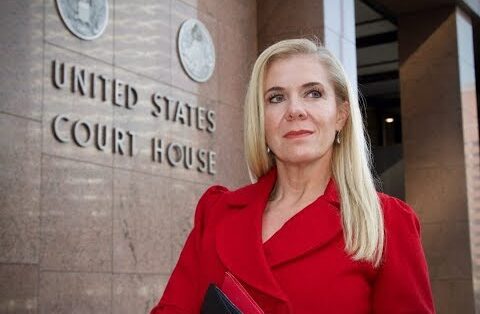Cases
SEC v. Cochran
CASE: Michelle Cochran v. U.S. Securities and Exchange Commission
STATUS: Closed
NCLA ROLE: Counsel
COURTS HEARD IN: SCOTUS, 5th Cir., N.D. Tex.
ORIGINAL COURT: U.S. District Court for the Northern District of Texas
DECIDING COURT: U.S. Supreme Court
OPENED: December 31, 2018
AGENCIES: Securities and Exchange Commission
FOCUS AREAS:
CASE SUMMARY
Today, administrative agencies issue rules with the force of law, enforce laws, and prosecute people in proceedings before administrative law judges they hire. NCLA’s client Michelle Cochran worked as an auditor with a small Texas accounting firm until 2013, but she fell prey to this system when the U.S. Securities and Exchange Commission brought an enforcement action against the firm three years later and named her as a defendant, claiming she aided and abetted its alleged federal accounting rule violations. Representing herself, Ms. Cochran fought the allegations against her in a proceeding before an ALJ SEC hired to hear the case. At the time, SEC ALJs were hired by the prosecuting agency like any other civil servant. Unsurprisingly, ALJs rule for SEC in most cases. In 2017, Ms. Cochran’s ALJ ruled against her, imposing a $22,000 fine and banning her from practicing as an accountant before SEC for five years.
Then, the U.S. Supreme Court ruled in June 2018’s Lucia v. SEC decision that SEC ALJs must be appointed by the president rather than hired by the agency. SEC subsequently concluded that everyone facing pending enforcement proceedings had to be retried before new ALJs, assigning Ms. Cochran’s case to a new ALJ for a do-over in 2018.
To “faithfully execute the laws” under the Constitution, the president must be able to appoint and remove all federal officers. But SEC ALJs, like most civil servants, are protected by what amounts to life tenure. If the president cannot remove “officers” such as ALJs, then he can’t control the administrative agencies he’s charged with overseeing. The Supreme Court unanimously held in April 2023 that Ms. Cochran had the right to challenge the constitutionality of her ALJ’s removal protections in federal court before undergoing an administrative adjudication, a major NCLA victory.
OUR TEAM
ADDITIONAL VIDEOS
Silenced for Life: The Injustice of Government Censorship of Speech
The Punishment is the Process
RELEVANT MATERIALS
NCLA FILINGS
Order of U.S. District Judge Reed O'Connor
September 27, 2023 | Read More
Joint Stipulation of Dismissal
September 26, 2023 | Read More
Motion to Reconsider and Amend the Final Order
June 20, 2023 | Read More
Appellant's Reply Brief
May 12, 2023 | Read More
Opinion of the U.S. Supreme Court
April 14, 2023 | Read More
PRESS RELEASES
SEC Surrenders to NCLA Client Michelle Cochran in Wake of Her Unanimous Supreme Court Win
September 27, 2023 | Read More
Victory! U.S. Supreme Court Holds that Federal District Courts Have Jurisdiction to Hear Challenges to Unconstitutional Aspects of Federal Agencies’ Administrative Proceedings
April 14, 2023 | Read More
Watch: The Punishment Is the Process – Administrative Law Judge Proceedings Are Unconstitutional
April 14, 2023 | Read More
NCLA Asks High Court to Uphold Federal Court Jurisdiction over Unconstitutional Agency Proceedings
November 7, 2022 | Read More
NCLA’s Supreme Court Reply Brief Refutes SEC’s New Arguments Against District Court Jurisdiction
September 8, 2022 | Read More
IN THE MEDIA
The SEC Puts Itself on Moot—Answering Justice Robert Jackson’s Eight-Decade-Old Query—Has the SEC Become a Law Unto Itself?
September 19, 2023
The Self-Regulated Art Market Leaves Bureaucrats Concerned about Job Security
NCLA Blog
June 19, 2023
The Demise of the SEC’s Adjudication System
June 9, 2023
SEC Says Employees Improperly Accessed Privileged Legal Records
WSJ
February 7, 2023
SEC Finds Enforcement Staff Accessed Privileged Docs
Law360
February 7, 2023
CASE HIGHLIGHTS
Media Mention
February 7, 2023
SEC Says Employees Improperly Accessed Privileged Legal Records
Source: WSJ
Press Release
April 14, 2023
Victory! U.S. Supreme Court Holds that Federal District Courts Have Jurisdiction to Hear Challenges to Unconstitutional Aspects of Federal Agencies’ Administrative Proceedings

